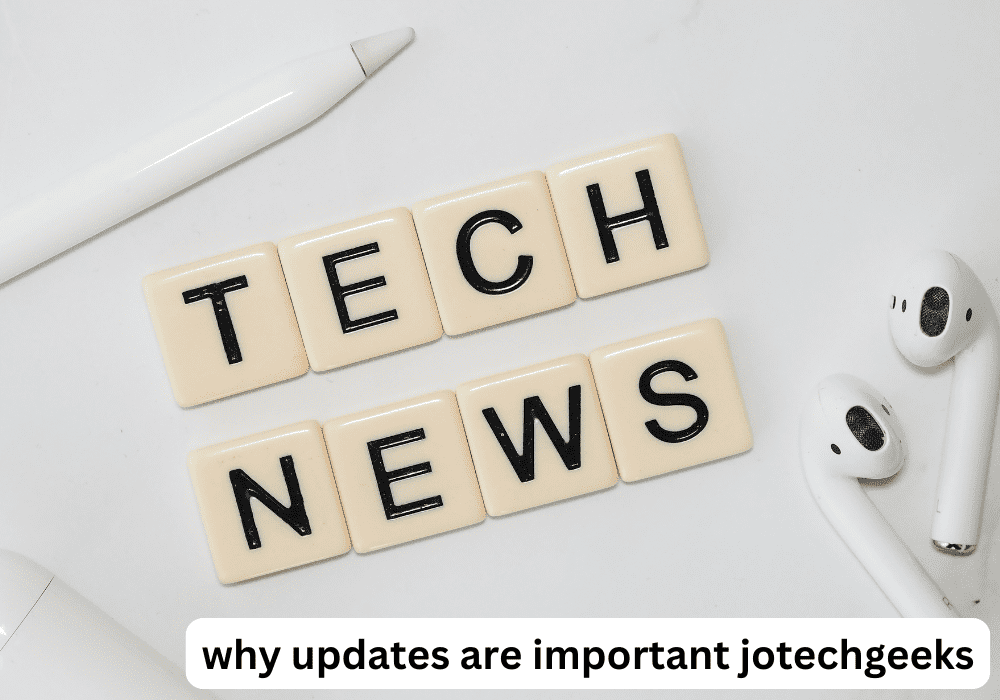Table of Contents
Introduction: Why Updates Are Important Jotechgeeks’ Perspective
In today’s fast-paced digital world, technology evolves rapidly. Every new advancement brings both innovation and new challenges, making regular updates essential to maintain optimal performance. At JotechGeeks, we understand how vital updates are in ensuring your devices, apps, and systems function properly. Whether it’s a security patch for your mobile phone, a performance tweak for your PC, or a firmware update for your smart TV, keeping your software current isn’t just a recommendation—it’s a necessity.
With years of experience guiding tech enthusiasts and professionals alike, JotechGeeks emphasizes the critical role updates play in protecting your devices, improving functionality, and enhancing user experience. In this guide, we’ll explore Why Updates Are Important Jotechgeeks and how they can have a significant impact on your daily tech usage.
The Evolution of Software Updates: A Brief History
Understanding Why Updates Are Important Jotechgeeks requires a look back at their evolution. Early computer systems and software did not feature regular updates, meaning users often dealt with bugs, glitches, and security flaws without resolution until a new version was released—sometimes years later.
The rise of the internet in the late 1990s and early 2000s made regular updates possible, particularly through automatic updates. Companies like Microsoft and Apple began pushing patches and updates to their operating systems to fix bugs, improve performance, and address security vulnerabilities. As software became more complex and interconnected, these updates shifted from being occasional to a regular part of the user experience.
At JotechGeeks, we see this evolution as a testament to the importance of updates. Without them, systems become outdated, vulnerable, and inefficient. The ongoing evolution of updates continues to influence the way technology works in the modern era, especially with the rise of the Internet of Things (IoT) and cloud computing.
Types of Updates: Software, System, and Firmware
When discussing Why Updates Are Important Jotechgeeks, it’s crucial to differentiate between the various types of updates:
- Software Updates: These are regular updates for applications and programs you use daily. They include new features, security patches, and performance optimizations. Examples include updates for web browsers, office software, and gaming apps.
- System Updates: These are updates to your device’s operating system (OS). For example, iOS updates for Apple devices or Windows updates for PCs. System updates often involve significant changes, including feature enhancements, security improvements, and bug fixes.
- Firmware Updates: Firmware is the embedded software in your hardware devices (such as routers, smart TVs, or printers). Firmware updates are less frequent but crucial for enhancing device performance and ensuring compatibility with new software.
Each type of update plays a unique role in maintaining the functionality, security, and overall performance of your devices. Ignoring any of them can lead to serious issues down the line, which is why keeping up with all types of updates is essential for smooth device operation.
Security Patches: The Most Critical Aspect of Updates
Among all the reasons Why Updates Are Important Jotechgeeks, security is perhaps the most pressing. In an increasingly connected world, cyber threats are constantly evolving. Hackers, malware, and viruses exploit vulnerabilities in software, putting personal data, financial information, and sensitive company files at risk.
Security patches are updates that address these vulnerabilities. Software developers identify potential security holes and release patches to fix them. For instance, operating systems like Windows, macOS, and Android frequently release updates to safeguard against new malware and ransomware attacks.
JotechGeeks always advises users to prioritize security updates because they:
- Protect against new viruses, malware, and phishing schemes.
- Ensure compliance with data protection laws like GDPR, especially for businesses handling customer data.
Skipping security patches can make your devices an easy target for cybercriminals. This is why we consistently stress the importance of updating systems immediately when security fixes are released.
Performance Enhancements: Boosting Speed and Efficiency with Updates
Apart from security, another significant reason Why Updates Are Important Jotechgeeks is the impact they have on your device’s performance. Over time, software and hardware can become sluggish, resulting in slower performance and reduced efficiency.
Regular updates often include performance enhancements that help improve the speed, efficiency, and overall functionality of your device. Whether it’s reducing the startup time of your computer, optimizing the battery life of your smartphone, or improving the responsiveness of your gaming console, these updates ensure that your tech runs smoothly.
Examples of performance improvements include:
- Faster load times for apps and programs.
- Better resource management, reducing the strain on system memory and CPU usage.
- Battery optimizations that prolong the lifespan of your mobile devices.
At JotechGeeks, we emphasize that users should always update their devices to benefit from these performance boosts, particularly as new hardware features and processing capabilities emerge.
Bug Fixes: How Updates Resolve Common Issues
No software is perfect. Even the most rigorously tested programs can experience glitches, crashes, or performance issues after release. This is why updates are vital—they often include bug fixes to resolve common issues reported by users.
For example, you might have encountered an application that freezes unexpectedly or an operating system that crashes when running certain tasks. Through updates, developers address these problems, ensuring a smoother, more reliable user experience.
JotechGeeks strongly recommends installing updates as soon as they become available, as ignoring bug fixes can result in:
- Frustrating crashes that interrupt work or leisure activities.
- Data loss due to software malfunction.
- Incompatibility with new hardware or software.
Without regular updates, these minor issues can become major headaches, making it clear why updates are so important.
New Features and Functionality
One of the most exciting reasons Why Updates Are Important Jotechgeeks is the introduction of new features and functionality. Over time, software developers enhance their programs with innovative tools and features that offer more value to users.
For instance, updates might introduce:
- New customization options for apps and operating systems.
- Enhanced integration with cloud services like Google Drive or OneDrive.
- New tools that streamline workflows, such as AI-powered features or voice assistants.
An excellent example is the frequent updates rolled out by Google for its apps like Gmail or Google Docs, often introducing features like real-time collaboration, smart compose, and offline access.
At JotechGeeks, we believe updates not only keep your software current but also give you access to cutting-edge technologies that can improve both productivity and convenience.
User Interface (UI) and Experience (UX) Improvements

In the digital age, User Interface (UI) and User Experience (UX) are critical for ensuring ease of use and engagement with software and apps. Updates often improve UI and UX elements, making them more intuitive, responsive, and enjoyable to use.
UI updates can include:
- Improved navigation to make menus, buttons, and tools easier to find.
- Cleaner layouts that reduce clutter and improve readability.
- Enhanced design elements that make apps more visually appealing.
UX updates often focus on making the software more functional and user-friendly. For example, they might reduce the number of steps required to complete a task, introduce shortcuts, or improve accessibility features.
By constantly improving UI and UX, developers ensure that their software remains competitive and aligned with user expectations. JotechGeeks encourages users to embrace these changes as they often lead to a more seamless and satisfying experience with their favorite apps and systems.
Compatibility: Ensuring Smooth Operation Across Devices and Software
As technology continues to evolve, maintaining compatibility between different devices, platforms, and software is crucial. Updates are essential for ensuring that your apps and systems can communicate and operate effectively with each other.
For example, without updates, your older devices or software may struggle to work with newer hardware or operating systems. This can result in:
- Software crashes when trying to run on newer devices.
- Incompatibility with peripheral devices such as printers, scanners, or external drives.
- Loss of access to important apps or services due to outdated versions.
At JotechGeeks, we emphasize that staying updated ensures that your devices and apps remain fully functional and compatible, allowing you to take advantage of the latest technological advancements without interruptions.
Why Delaying Updates Can Be Risky
Procrastinating when it comes to updates can have serious consequences. Here’s why delaying updates can be risky:
- Security Vulnerabilities: As mentioned earlier, failing to install security patches can leave your system open to attack, putting personal and financial information at risk.
- Performance Degradation: Without performance updates, your system can become slower over time, leading to frustrating delays and reduced productivity.
- Incompatibility Issues: Delaying updates might cause compatibility problems with newer hardware or software, preventing you from using your devices efficiently.
- Loss of Support: Software companies eventually stop supporting outdated versions of their apps or operating systems. If you don’t update, you may find yourself unable to receive further support, security updates, or new features.
At JotechGeeks, we advise users to install updates promptly to avoid these risks and maintain optimal device performance and security.
How to Manage Updates Efficiently
One concern many users have is managing updates without disrupting their workflow. At JotechGeeks, we recommend the following strategies for managing updates efficiently:
- Schedule Updates: Many devices allow you to schedule updates during off-peak hours, ensuring that updates don’t interfere with your productivity.
- Enable Automatic Updates: Whenever possible, turn on automatic updates for your apps and operating systems. This ensures that updates are installed as soon as they are released.
- Check for Updates Regularly: For devices that don’t offer automatic updates, make it a habit to check for updates regularly. This includes everything from your smartphone to your router.
By following these tips, you can ensure that your devices remain up-to-date without unnecessary disruptions.
Updates for Mobile Devices: Android vs. iOS
Mobile devices are now central to our daily lives, making updates more critical than ever. Whether you’re an Android or iOS user, updates play a key role in ensuring security, performance, and access to the latest features.
Android: Android users often receive updates directly from device manufacturers (Samsung, Google, etc.), and these updates can vary in frequency and size. It’s essential for Android users to install security patches as they become available, as Android is more vulnerable to malware attacks.
iOS: Apple’s iOS updates tend to be more consistent and are rolled out globally at the same time. iOS updates typically include security patches, performance improvements, and new features, making them critical for maintaining optimal device functionality.
At JotechGeeks, we advise users of both platforms to stay on top of updates for enhanced performance and security.
The Role of Updates in the IoT (Internet of Things) Era
With the rise of the Internet of Things (IoT), where devices like smart thermostats, refrigerators, and wearables are connected to the internet, updates have become more important than ever.
IoT devices are often targets for cyberattacks because they’re connected to the internet but may not have robust security measures. Regular updates for IoT devices help:
- Secure network connections and prevent unauthorized access.
- Improve interoperability between devices, ensuring smooth communication across various platforms.
- Enhance functionality by adding new smart features and integrations.
At JotechGeeks, we predict that the importance of updates will only grow as more homes and businesses adopt IoT technologies, making it crucial to keep all devices, not just smartphones and computers, up to date.
JotechGeeks’ Tips for Keeping Your System Updated
At JotechGeeks, we’ve compiled some tips to help you stay on top of updates:
- Turn on automatic updates whenever possible, particularly for essential apps and operating systems.
- Regularly check for firmware updates for devices like routers, smart TVs, and IoT gadgets.
- Use security software to scan for vulnerabilities that can be patched by updates.
- Back up your data before performing major updates, especially for system or firmware updates.
- Follow tech blogs like JotechGeeks to stay informed about critical updates for your devices and software.
By adopting these habits, you’ll ensure that your system stays secure, efficient, and fully functional.
FAQs About Why Updates Are Important Jotechgeeks
Q1: Why are updates necessary for mobile apps?
Updates improve app performance, introduce new features, and fix bugs or security vulnerabilities, ensuring a better user experience.
Q2: Can delaying updates harm my device?
Yes, delaying updates can expose your device to security risks, cause compatibility issues, and lead to poor performance.
Q3: How often should I update my software?
It depends on the type of software, but generally, you should update as soon as new versions or security patches become available.
Q4: What happens if I ignore a firmware update?
Ignoring firmware updates can result in reduced functionality, compatibility issues, and even security vulnerabilities for your hardware devices.
Q5: Can updates cause my system to slow down?
While some updates may temporarily affect system performance during installation, they are designed to improve long-term functionality and efficiency.
Conclusion: Embrace the Importance of Updates with JotechGeeks
In conclusion, Why Updates Are Important Jotechgeeks cannot be overstated. From improving security to boosting performance, updates ensure that your devices remain functional, efficient, and protected from threats. At JotechGeeks, we advocate for regularly updating all your systems—whether it’s your phone, computer, or IoT devices. Stay current, stay safe, and embrace the future of technology with confidence by keeping your software up to date.




